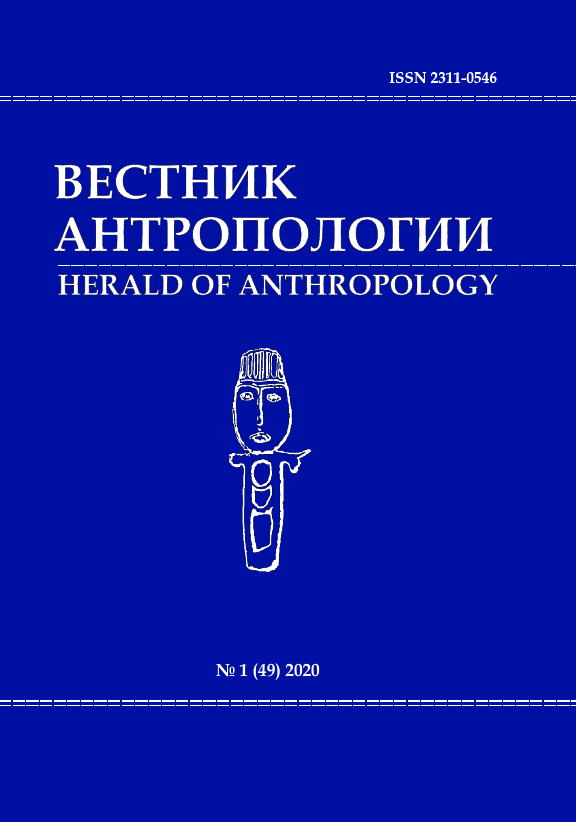Development of Psychological School within German Ethnology in the second half of the 19th – first half of the 20th centuries
DOI: 10.33876/2311-0546/2020-49-1/231-238
Keywords:
German ethnology, German-language ethnology, ethnology of Germany, sociocultural anthropology, spirit of nation, national character, racial idea, psychological directionAbstract
The article is devoted to the history of German ethnology in the second half of the 19th - first half of the 20th centuries. Despite the similarity of the trajectories of European and American anthropology in general, German ethnology had a number of specific features. First of all, these are the very concepts “German ethnology,” “German-language ethnology” and “ethnology of Germany” themselves. The author highlights the following special aspects of German ethnology in the given period. Firstly, it is influence of German philosophical heritage. Secondly, it is a differentiation of German ethnology. Thirdly, the psychological direction of ethnology was born in Germany. Fourthly, it is a specific coexistence with the ideology of Nazism in the 1930s and first half of the 1940s. Besides, after 1945, German ethnology is divided into the ethnology of FRG and the ethnology of GDR, which is not true about the USA, Great Britain, France and other countries housing major ethnological centers.
References
- Folieva, T.A., and O.A. Shinkar. 2007. Elementarnye idei Adol'fa Bastiana [Elementary ideas of Adolf Bastian]. Vestnik VolGU 9 (6), 215–218.
- Gerder, J.G. 1977. Idei k filosofii istorii chelovechestva [Ideas for the philosophy of the history of mankind]. Moscow: Nauka.
- Kant, I. 1964. Nabliudeniya nad chuvstvom prekrasnogo i vozvyshennogo [Observations of the sense of beauty and exaltation]. In Kant I. v 6 tomah [Works in 6 volumes]. 1963–1966. Vol. 2, 168–184.
- Kant, I. 1966. Antropologiya s pragmaticheskoi tochki zreniya [Anthropology from a pragmatic point of view]. In Kant I. v 6 tomah [Works in 6 volumes]. 1963–1966. Vol. 6, 349–588.
- Khan, V.S. 2013. O printsipah klassifikatsii I sostoyanii istoriograficheskih issledovaniy v koeevedcheskoy diasporologii [On the principles of classification and the state of historiographic research in Korean studies diasporology]. In Uzbekiston Tarihi 1, 65–77.
- Kuznetsova, T.V. 2000. Iskusstvo i “duh naroda” v problematike nemetskoy esteticheskoy mysli kontsa XVIII – nachala XIX veka [Art and the "spirit of the people" in the problems of German aesthetic thought of the late XVIII – early XIX centuries]. In Filosofiia i obshchestvo 3 (20). https://www.socionauki.ru/journal/articles/521473.
- Markov, G.E. 2004. Nemetskaya etnologiya [German ethnology]. Moscow: Akademicheskiy proekt.
- Matusovskiy, A.A. 1999. Kul'turnaya dinamika teoretiko-metodologicheskih paradigm nemetskoy etnologii (1945–1990gg) [The cultural dynamics of theoretical and methodological paradigms of German ethnology (1945–1990)]. PhD diss. Moscow.
- Shurts H. Istoriya pervobytnoy kul'tury [History of primitive culture]. Vol. 2. Osnovy kul'tury. Obshchestvo. Hozyaistvo [Fundamentals of culture. Society. The economy]. Izdanie. 2-e. Moscow.
- Shurts, H. 2010. Istoriya pervobytnoy kul'tury [History of primitive culture]. Vol. 1. Osnovy kul'tury. Obshchestvo. Hozyaistvo [Fundamentals of culture. Society. The economy]. Izdanie. 2-e. Moscow.
- Stefanenko, T.G. 2009. Etnopsihologiya [Ethnopsychology]. Moscow: Aspekt Press.
- Steinthal i Lazarus. 1865. Mysli o narodnoy psihologii [Thoughts on folk psychology]. Voronezh.
- Waitz, Th. 2012. Antropologiya pervobytnyh narodov [Anthropology of primitive peoples]. Vol. 1. Moscow: Kniga po Trebovaniyu.
- Wundt, V. 2002. Psihologiya narodov [The Psychology of Peoples]. Moscow: Eksmo; Sankt Peterburg: Terra Fantastica.





















